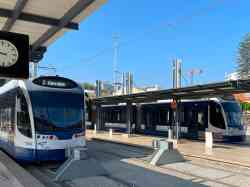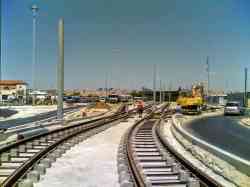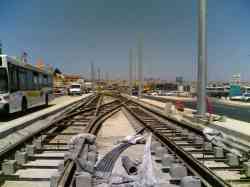|
Photos By Route
Tramway Facilities / Operators
Electric Bus Facilities / Operators
| V |
Alsa Todi Metropolitana de Lisboa, Lda. · Carris Metropolitana
Founded on 05.11.2020, and integrated into the Carris Metropolitana network as of 01.04.2022.
 | | 
The operator of both regular and electric buses serves the municipalities of Alcochete, Moita, Montijo, Palmela, and Setubal, while also offering routes to Almada, Barreiro, Lisbon, Seixal and Sesimbra.
Since April 2022, it has held the concession rights to operate within the Carris Metropolitana network for these municipalities, covering area 4 of the network and managing the lines designated as 4xxx.
Rolling stock listed in Setubal. |
List of the models
Vehicles without photos |
Maps
City Photo Galleries
Building and reconstruction
Information
|
Information about municipality
|
|---|


|
Almada
Founded: 1190
Area: 70,21km2
Population: 177`268
Almada is a coastal municipality situated in Portugal's Setúbal region, part of the Lisbon Metropolitan Area. It is positioned on the southern bank of the Tagus River and extends westward to the Atlantic Ocean, providing picturesque views of both the river and the ocean.
The municipality enjoys a robust public transportation network, which includes buses and the Metro Sul do Tejo light rail, catering to its urban areas. It is conveniently linked to Lisbon via the 25 de Abril Bridge, with regular commuter trains, buses, and ferry services across the Tagus River facilitating easy access to the capital.
Almada encompasses several parishes, including Almada, Cacilhas, Caparica, Costa da Caparica, Laranjeiro, and Feijó, and comprises two cities: Almada and Costa da Caparica.
|
|
Tram
|
|---|

Metro Transportes do Sul
Founded May 20th, 2002
Service started May 1st, 2007
www.mts.pt
|
System data
Length: 13,5km
Number of lines: 3
Track gauge: 1435mm
Electrification: 750 V DC overhead wire
The system extends into the adjacent Seixal municipality, connecting the Santa Amaro and Corroios stations over a distance of 1.4 kilometers, along with an additional 1.3 kilometers of service track leading to the depot.
History
The initial proposals for a circular railway connection in Almada trace back to the 1930s, leading to the establishment of the “Ramal do Seixal” line, which unfortunately was dismantled in 1970. The foundations for the current light rail system were laid in 1985, and by 1995, an agreement was reached between the Portuguese government and the municipalities involved — Almada, Seixal, Barreiro, and Moita. Interestingly, all relevant documents were signed at the Barreiro town hall, a location that, as of 2025, remains outside the network's reach and without approved extension plans towards it.
The 1995 project outlined three branches that exist today: Cacilhas (with two proposed routes, though only one has been constructed), Pragal/Universidade, and Corroios. The initial phase of this project was realized in 2007. However, several extensions remain incomplete, including the Universidade branch towards Costa da Caparica and Trafaria, as well as the Corroios branch towards Amora and Foguteiro. Furthermore, a fourth route linking Amora, Seixal, Barreiro, and Moita was also planned and not constructed.
As of 2024, the discussion for the extension project has gained renewed momentum, with an extension westward towards Costa da Caparica and a new proposal for an eastward expansion. The first phase of the eastward extension is anticipated to start from Corroios, traversing the central areas of Seixal and Barreiro before concluding at Alhos Vedros in Moita municipality. This phase could be developed as either Light Rail Transit (LRT) or Bus Rapid Transit (BRT). The second phase, proposed as BRT only, would commence at Alhos Vedros, moving through the central area of Moita and progressing further through Montijo and Alcochete municipalities.
Projects and constructions
The expansion of the network to the west, encompassing Costa da Caparica and Trafaria, received approval in 2024.
|
|
Tram routes
|
|---|
| Route Nr. | Line name | Route | Notes |
|---|
| 1 | Blue line | Cacilhas ⇄ Corroios (in Seixal municipality) | The original 1995 project proposed an alternative route connecting Cacilhas to Parque da Paz, with plans for future extension to Foguteiro. |
| 2 | Yellow line | Corroios ⇄ Pragal | The route remains unchanged from the original 1995 project, aside from the absence of an extension related to Amora. |
| 3 | Green line | Cacilhas ⇄ Universidade | In the original 1995 project, an alternative route was proposed connecting Almada and Pragal, with plans for extension to Costa da Caparica and Trafaria (which were approved in 2024). |
|
|
Electric buses
|
|---|

Carris Metropolitana
Founded April 1st, 2022
www.carrismetropolitana.pt

Alsa Todi
Founded November 5th, 2020
|
The Carris Metropolitana network offers bus services throughout the Lisbon metropolitan area, featuring routes that operate within individual municipalities, connect neighbouring municipalities, or provide direct access to Lisbon.
The metropolitan area is divided into four zones, with Lisbon at the center, and each of the four licensed operators managing their respective areas while facilitating seamless travel across zones. These operators have assumed control of nearly all local routes established before 2022, ensuring a consistent level of service across the entire metropolitan region. Barreiro and Cascais are the only two municipalities that have maintained their own bus operators independent of the Carris Metropolitana network; however, by 2025, they do not operate electric buses.
Each route number in the Carris Metropolitana network consists of four digits, where the first two digits indicate the route's location. The first digit represents the network area (1, 2, 3, or 4), while the second digit denotes the route type (0, 1, 2, 3, or 4 for routes within a single municipality with each number indicating which municipality from this area; 5 for inter-municipal connections; 6 for routes linking Barreiro and Cascais; 7 and 8 for routes connecting to Lisbon; and 9 for routes extending beyond the Lisbon metropolitan area). The last two digits simply represent the route number, which may sometimes correspond to a local route established before 2022.
In Almada, which is part of area 3 of the network, Transportes Sul do Tejo serves as the primary operator; however, as of May 2025, it does not utilize electric buses. The adjacent operator in area 4, Alsa Todi from Setubal, operates certain bus routes (numbered 47xx) that service Almada and may incorporate electric buses.
|
|
|
Random Photo

     
|
 Urban Electric Transit
Urban Electric Transit





























 |
| 



